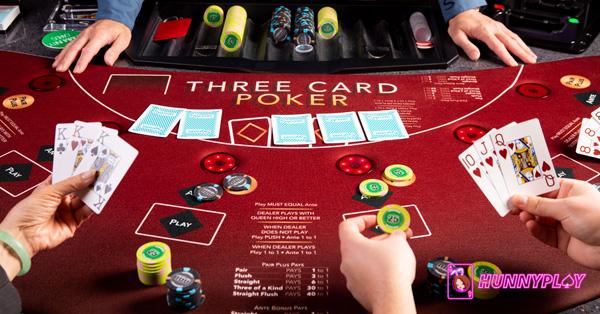Poker is the ultimate card game, blending strategy and chance, enjoyed globally in casinos. This guide by HunnyPlay covers essential “How to Win at Poker” strategies for beginners to avoid quick losses and enhance gameplay, offering everything needed to win at this game.
Are online Poker tips the same as traditional Poker tips?
Online Poker has become the dominant form of Poker globally. During the COVID-19 lockdown, the number of online Poker players surged by 255%, highlighting the game’s vast popularity and making it even more competitive.
Most Texas Hold’em tips for beginners are applicable to both online and live games, but there are distinct differences.
The main difference is that online players often play multiple tables simultaneously, allowing them to play hundreds of hands per hour, whereas live games are much slower. Additionally, you can’t use physical “tells” online since you can’t see your opponent.
Though tips about physical tells aren’t relevant to online play, fundamental strategies remain crucial regardless of where you play and how to win at Poker.

Online Poker differs from traditional Poker by allowing players to play multiple tables and hundreds of hands per hour. (Source: Internet)
8 useful tips to solve the problem of How to win at Poker
Learning how to win at Poker requires more than luck – it demands strategy, patience, and smart management of your resources. Here are essential tips to elevate your game and help you win at Poker:
Limit your range
One common mistake among beginners and losing players is playing too many weak starting hands. It’s tempting to play numerous hands, especially after watching professionals like Tom Dwan seemingly play every hand on TV.
However, patience is crucial if you are learning how to win at Poker, particularly against aggressive, experienced players.
This doesn’t mean only playing aces or kings. You can still play suited connectors in position but avoid overplaying hands.
For newcomers, it’s vital to maintain a tight range. As you gain experience, you can expand your preflop range and learn to win with various hands.
Play a balanced range
Maintaining a balanced range is important to keep your opponents guessing. Avoid always continuation-betting on a flop with a strong hand.
Sometimes, check-raise a flopped flush draw; other times, just call. Three-bet with a suited ace from the big blind in one hand, and simply call the next.
Predictable players are easy to beat. By mixing up your playstyle, you prevent opponents from easily reading your hand.
A balanced approach ensures you get paid on strong hands and your bluffs succeed. Poker is a game of deception; if you can’t mislead your opponents, you won’t win.
Bankroll management
Poor bankroll management is a significant cause of failure in Poker. To win consistently, you need a substantial bankroll. Regardless of skill, you will face losing streaks where luck doesn’t favor you.
Bad beats happen; opponents will sometimes hit every draw. To withstand these swings, you should have a bankroll at least 25 times the buy-in for the games you play.
For those on a budget, starting with online Poker can be a cost-effective way to hone your skills. Online platforms, like HunnyPlay, offer free Poker games, providing valuable practice without financial risk.
Learn to accept defeat
Bad luck can devastate a Poker career. Everyone faces losing sessions and gutshot straight draws that hit against them. However, don’t let this shatter your confidence while playing Poker. Poker demands mental resilience in addition to good hands from Lady Luck.
Never get too high
Maintain a level head regardless of your results in the quest to master Poker. Avoid getting overly excited after a win unless it’s a major event like a World Series of Poker bracelet.
Celebrate small victories modestly because Poker’s ebb and flow means you might win $300 one night and lose it the next. Excitable new players need to cultivate steadiness for long-term success.
Continue learning through practice, low-stakes games, strategy articles, and advice from other players.
Network with other players
Networking in Poker is akin to running a business. Engage with successful players on forums and social media. Having good players in your circle is invaluable on your journey to learn how to Win at Poker.
You can discuss hand histories and receive feedback, boosting your confidence after tough sessions. Remember, winning Poker players’ networks to enhance their game
Don’t be afraid to get bluffed
No one enjoys being bluffed, but it’s an integral part of learning how to Win at Poker. When your opponent reveals a bluff after you’ve folded a winning hand, it can sting.
However, even the world’s best players fall victim to bluffs occasionally. This is simply part of the game.
Folding the best hand now and then is better than constantly losing money because your ego won’t let you fold out of fear of being bluffed.
Let aggressive players win small pots; you’ll secure the bigger wins when they pay off your stronger hands. This is a strategy that skilled Poker players use to dominate the game.
Check your ego at the door
Famous heads-up Poker showdowns, like Daniel Negreanu vs. Doug Polk or Fedor Holz vs. Wiktor Malinowski, often start from feuds fueled by ego. These confrontations can lead to significant losses for the inferior player who can’t back down.
Negreanu, for example, lost $1.2 million to Polk because he couldn’t resist the challenge. While “Kid Poker” can afford such losses, most players can’t.
Avoiding ego-driven battles is an important lesson in learning how to win at Poker. Your primary goal should be to maximize your winnings, not to prove a point.

Winning at Poker requires more than luck – it demands strategy. (Source: Internet)
What skills do you need to conquer Poker?
Poker isn’t for everyone. While some individuals are intelligent, they may struggle to grasp the essential skills required to excel in the game. The challenges of learning how to win at Poker come up in unexpected ways, even in an online environment.
Though each player is unique, 3 core skills are crucial for anyone aiming to master Poker with winning strategies:
Patience
Patience is paramount in Poker. You might sit at a table for 20 minutes or more without a good hand. Impatient players often stray from their strategy out of boredom, leading to disastrous hands.
The tightest players may play fewer than 10 hands during a long session. Even aggressive players, known as loose cannons, exhibit patience by choosing the right moments to act.
Patience means having a strategy and adhering to it. It’s about maintaining composure, even if you only win the blinds with pocket aces and nothing more in the next hand.

Ability to read people
At its core, Poker is a game of truth and deception. It’s about discerning who is honest and who is bluffing.
Poker’s allure lies in its psychological battles. Even in online Poker, controlling your emotions is crucial. Skilled players can detect when someone is betting emotionally or concealing a bluff poorly.
Reading people is a vital skill for learning how to win at Poker, as most individuals can’t hide their emotions effectively. You can read people by observing:
- Their strategy at the table
- Their reactions to bad hands
- Their responses to good hands
- Their chat messages
In live games, physical tells are invaluable. Signs like sweating, frequent glances at other players, and how they push their chips can reveal a lot. Mastering this skill requires experience and practice.

Mastering the art of reading people and controlling your emotions to discern truth from deception is an important aspect to win Poker. (Source: Internet)
Keep a winning strategy
Poker offers numerous strategies, from basic to hybrid approaches. Professionals tailor their strategies to different situations and opponents.
As a beginner, stick to a single strategy and master it. Most novices opt for a conservative approach, playing only the strongest hands aggressively.
Once you gain experience, you can explore advanced tactics like semi-bluffing and 4-bets.
Dan Cates, a highly successful professional Poker player, emphasizes the importance of a growth mindset in learning how to win at Poker. Embrace the possibility of adopting new strategies and continuously improving your game.
How to Play better at Poker?
If you are a beginner on the journey of exploring Poker, we have distilled 7 concise tips to help you improve your skills.
#1 – Think about ranges, not Hands
- Focus on your opponent’s range of hands rather than guessing a specific hand.
- Advanced players consider all possible hands to improve their pot odds calculations.
- Recognize that opponents have various hands with different frequencies.
- Make decisions based on logical analysis, not intuition.
#2 – Ditch your favorite Hand
- Avoid favoring specific hands; even hands you like may not be strong.
- Recognize when to play hands like 9-7 suited; use them wisely in late positions.
- Fold weaker hands in early positions.
- Base your strategy on math and logic, not superstition.
- Winning Poker relies on strategic, logical decisions.
#3 – Adopt a consistent strategy
- Consistently apply a winning strategy to excel in Poker.
- Avoid changing your approach due to boredom or frustration.
- Stick to your strategy in every hand and session.
- Top players succeed by repeatedly using effective strategies.
- Consistency, not emotion, drives long-term Poker success.
#4 – Always have a reason
- Elite players deviate from strategies for clear, logical reasons.
- Average players change tactics out of boredom or frustration.
- Raise with hands like 9-7 suited in early position only when the table is passive.
- Logical deviations can be profitable; impulsive changes are not.
- Maintain disciplined, strategic play for consistent success.
#5 – Know when to fold your Aces
- Great Poker players know when to fold an overpair.
- Trust that uneasy feeling when a tight opponent goes all-in on the turn.
- Recognize patterns at lower stakes, especially in online Poker.
- Detach emotionally from strong hands like aces or kings.
- Avoid getting “married” to your hand; fold when necessary to avoid losses.
#6 – Realize tilt only hurts you
- Tilt can ruin your bankroll, dreams, and Poker career.
- Many players lose large portions of their bankrolls due to tilt when things go poorly.
- Bad runs are part of Poker, and you must accept this reality.
- Losing control and abandoning strategy only harms you.
- Respect your efforts; maintain composure and avoid emotional decisions.
#7 – Don’t play bad games
- Avoid playing in games full of skilled regulars.
- If no one at the table is playing poorly, reconsider your choice.
- If your goal is enjoyment, this may not apply.
- To win money, seek games with players making major mistakes.
- Remember, you profit by exploiting significant errors, not tiny edges.

Network with successful players to gain valuable feedback and support while playing Poker. (Source: Internet)
How to win at Poker – FAQs
Q: How do I win in Poker?
A: To win at Poker, you need to either bluff your opponents or have the best hand at the showdown. The goal is to form the strongest possible five-card hand.
Q: Is there a strategy for Poker?
A: Yes, Poker strategy involves a series of choices that guide players’ actions to maximize profits. It encompasses game-theoretic aspects like imperfect information and the element of chance, helping players make optimal decisions.
Q: Is Poker 100% skill?
A: In the short term, up to 80% of Poker can be attributed to luck. However, over the long term, Poker is nearly 100% skill-based as mathematical probabilities even out, minimizing the role of luck.

To win at Poker, beginners should play a tight range of strong hands and avoid overplaying weak ones. (Source: Internet)
Conclusion
Learning how to win at Poker requires a blend of patience, strategic thinking, and the ability to read opponents. Employing a balanced strategy, managing your bankroll, and continually honing your skills are key to long-term success. Remember, while luck plays a role, skill ultimately prevails in Poker.
For more tips and in-depth strategies, visit HunnyPlay and elevate your game today.




















